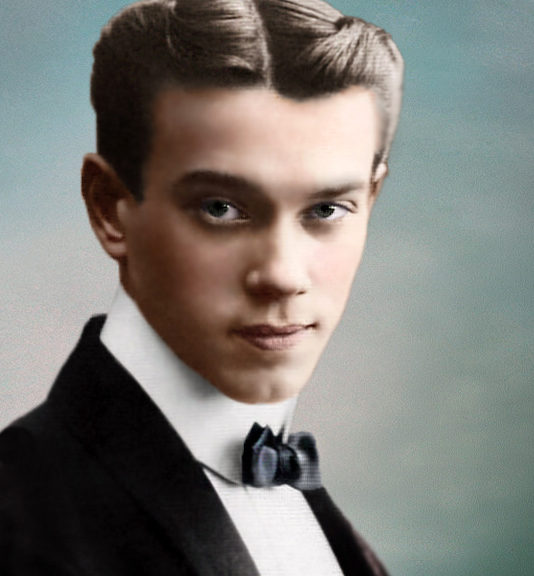VASLAV NIJINSKY, Polish ballet dancer (d. 1950); A Russian ballet dancer and choreographer of Polish origin. Nijinsky was one of the most gifted male dancers in history, and he became celebrated for his virtuosity and for the depth and intensity of his characterizations. He could perform en pointe, a rare skill among male dancers at the time and his ability to perform seemingly gravity-defying leaps was legendary.
A turning point for Nijinsky was his meeting with Sergei Diaghilev, a member of the St Petersburg elite and wealthy patron of the arts, promoting Russian visual and musical art abroad, particularly in Paris. Nijinsky and Diaghilev became lovers, and Diaghilev became heavily involved in directing Nijinsky’s career. In 1909 Diaghilev took a company to Paris, with Nijinsky and Anna Pavlova as the leads. The show was a great success and increased the reputation of both the leads and Diaghilev throughout the artistic circles of Europe. Diaghilev created Les Ballets Russe in its wake, and with choreographer Michel Fokine, made it one of the most well-known companies of the time. His partnership with Tamara Karsavina, also of the Mariinsky Theatre, was legendary.
Nijinsky went back to the Mariinsky Theatre, but was dismissed for appearing on-stage wearing tights without the trunks obligatory for male dancers in the company. The Dowager Empress Marie Feodorovna complained that his appearance was obscene, and he was dismissed. It is probable that the scandal was arranged by Diaghilev so Nijinsky could be free to appear with his company, in the west, where many of his projects now centered around him. He danced leading roles in Fokine’s new productions Le Spectre de la Rose, a role never satisfactorily danced since his retirement, and Igor Stravinsky’s Petrushka, in which his impersonation of a dancing but lifeless puppet was much admired.
Of the thousands of descriptions of the famous dancer, only Cocteau’s suggests the “mortal god” that was Nijinsky. Cocteau alone observed “the contrast between the Nijinsky of Le Spectre de la Rose, bowing and smiling to thunderous cheers as he took his fifty curtain calls, and the poor athlete backstage between bows, gasping and leaning against any support he could find, half fainting, clutching his side, being given his shower and massage and rubdown by his attendance and the rest of us. On one side of the curtain he was a marvel of grace, on the other, an extraordinary example of strength and weakness…”
